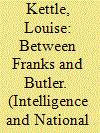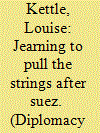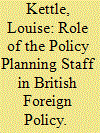|
|
|
Sort Order |
|
|
|
Items / Page
|
|
|
|
|
|
|
| Srl | Item |
| 1 |
ID:
143757


|
|
|
|
|
| Summary/Abstract |
Lessons for the intelligence community were publicly identified in a 1983 report by Lord Franks and a 2004 report by Lord Butler. However, little is known of the lessons learned during the 20 years between the two. This article draws upon two newly released, previously classified, documents which examine British intelligence lessons from the 1990–91 Gulf War. It provides a previously untold account of the crisis, exclusively from a British intelligence perspective, and presents new evidence that intersects across many intelligence debates. This article also challenges whether identified lessons remained learned and begins to question the wider learning process within the intelligence community.
|
|
|
|
|
|
|
|
|
|
|
|
|
|
|
|
| 2 |
ID:
146039


|
|
|
|
|
| Summary/Abstract |
This analysis re-instates the importance of the 1958 British intervention in Jordan within the study of Anglo–American relations and the revisionist literature on Suez. It does so by challenging the idea of British subservience to American foreign policy after the 1956 crisis, and it reveals two key lessons learnt by London: that Britain’s economy, power, and influence were in decline and that Britain could no longer intervene in the Middle East without American support. Having learnt these lessons, Prime Minister Harold Macmillan proved to be a shrewd political actor who used the opportunity of the Jordan intervention to turn the policy of the Dwight Eisenhower Administration to British ends, regaining Britain’s maximum power and prestige for the minimum loss of resources.
|
|
|
|
|
|
|
|
|
|
|
|
|
|
|
|
| 3 |
ID:
174325


|
|
|
|
|
| Summary/Abstract |
This analysis challenges the traditional approach to studying the creation of foreign policy within the Foreign and Commonwealth Office [FCO]. Whilst most historical and contemporary research has focused upon the role of the foreign secretary, permanent under-secretary, and senior overseas representatives, this exegesis argues that an overlooked department – the Policy Planning Staff and its contemporary successor, the Policy Unit – has had significant influence over the debate and direction of British foreign policy. Drawing upon documents received under the Freedom of Information Act, archival documents, and interviews conducted with current and previous members of the Staff and the wider FCO, it reveals the rationale for the planning department, its roles, structure, staffing, and influence on foreign policy over time. It concludes that the department has been, and remains, a crucial part of the policy-making process and, therefore, warrants further attention from historians and those interested in contemporary foreign policy analysis.
|
|
|
|
|
|
|
|
|
|
|
|
|
|
|
|
| 4 |
ID:
154968


|
|
|
|
|
| Summary/Abstract |
Terrorists learn every day to gain further knowledge on how to achieve their violent objectives. Consequently, understanding terrorist learning forms a crucial part of the fight to counter terrorism. However, while existing literature within terrorism studies has examined a number of different parts of the learning process, there currently fails to exist a comprehensive framework to encompass the learning process as a whole. This article will rectify this oversight by drawing on wider learning literature to develop a new analytical framework for terrorist learning that provides a definition, considers the actors involved and identifies processes and outcomes. Consequently, the full landscape of current and potential research in this important area is revealed.
|
|
|
|
|
|
|
|
|
|
|
|
|
|
|
|
|
|
|
|
|